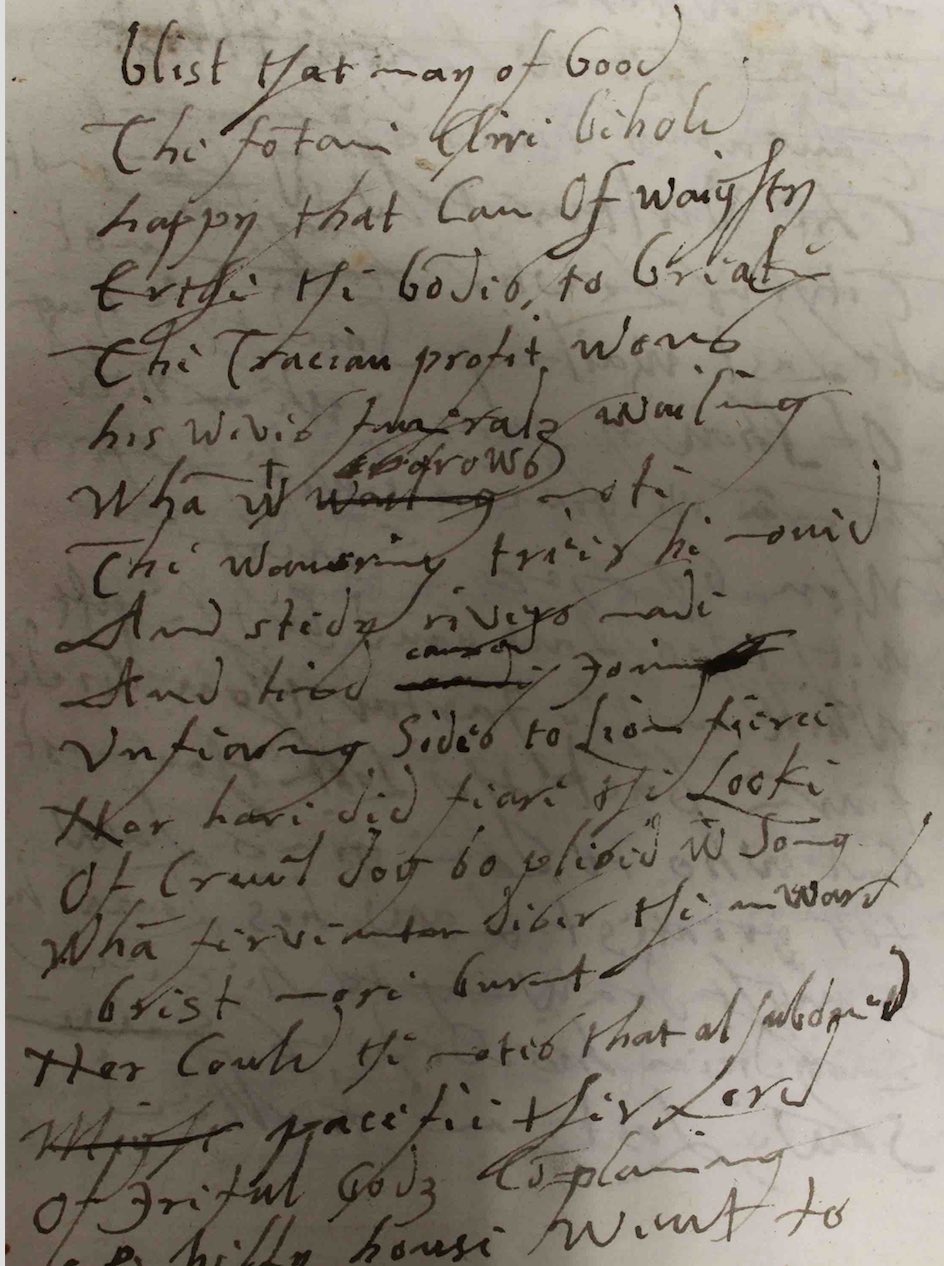419. Write Till Your Ink Be Dry: Humanism in Britain
Humanism comes to England and Scotland, leading scholars like Thomas Eylot and Andrew Melville to rethink philosophical education.
Image: Queen Elizabeth's translation of Boethius
Themes:
• E.R. Holloway, Andrew Melville and Humanism in Renaissance Scotland 1545-1622 (Leiden: 2011).
• J. McConica, English Humanists and Reformation Politics under Henry VIII and Edward VI (Oxford: 1965).
• A. McLean, Humanism and the Rise of Science in Tudor England (London: 1972).
• S.J. Reid, Humanism and Calvinism: Andrew Melville and the Universities of Scotland, 1560–1625 (Farnham: 2011).
• R.J. Schoeck, “Humanism in England,” in A. Rabil, Jr. (ed.), Renaissance Humanism, Volume 2: Foundations, Forms, and Legacy (Philadelphia: 1988), 5-38.
• R. Weiss, Humanism in England During the Fifteenth Century (Oxford: 1967).
• J. Woolfson (ed.), Reassessing Tudor Humanism (Houndsmill: 2002).







Comments
Wales, Ireland, and Cornwall
Hey Peter.
Been enjoying these episodes so far. I was wondering though, the reformation happened in Wales, Cornwall (since Cornwall was still quite separate culturally from England and even had their own Rebellion when the English tried to introduce the First Common Book of Prayer), and Ireland (I guess Ireland would be a different issue in a lot of ways though, considering we are still a bit away from Ireland's colonisation).
Did none of these three produce anything that was philosophically interesting enough during the reformation? For Ireland it would make some sense, given the aforementioned reason. For some reason I wouldn't be shocked if this was true for Cornwall, despite not being able to think of any reason unlike Ireland why that would be. But Wales would be a little shocking.
In reply to Wales, Ireland, and Cornwall by Andrew
Elsewhere in the British Isles
Yes that's a good point and I have to say I had been thinking about it myself - especially with regard to Ireland. But I haven't really come across much about these other regions as I have read around; I'd be grateful if anyone has suggestions of things missed out that I should have covered. Obviously there would be a lot to say about the history of Ireland, Wales etc in these periods but this isn't a history podcast, I only delved so much into the history to give the context for philosophical developments. So the issue for our purposes is whether there were significant intellectuals there that I missed out in the 15/16th centuries.
In reply to Elsewhere in the British Isles by Peter Adamson
A idea for the future
I just started reading some history about Cornwall and was reminded of our discussion here and have an idea you could do.
This could be another thing to look at for the series at episode 500? I can't say I know any intellectual myself specifically for the renaissance/reformation, but it would also be an opportunity to talk about the British isles and its various nations before the renaissance/reformation as well, assuming there is anything worthwhile (which, given the wide definition of philosophy we are working with, I am sure there is - probably lots of stuff to pull from folklore, mythology, oral histories and stories, medieval literature etc. And not to mention the material that could be pulled from Druids. I mean, from a quick google search, it seems that even two classical writers were willing to call Druids philosophers, with their primary domains being moral and natural philosophy, so overall it seems promising).
For Cornwall specifically, I would say email Philip Payton. Back of my Cornish history book says he is the Director of the Institute of Cornish Studies at Exeter University, but it is an old edition and Exeter University's page says he left in 2013. But that should still be evidence of credentials. I can't give any recommendations for Wales and Ireland, but I am sure professors and resources for them are easier to find than with Cornwall haha.
In reply to A idea for the future by Andrew
Druids
To be totally honest the word "Druid" takes me back to my youth and playing Dungeons & Dragons, but I realize that isn't relevant. What you're suggesting sounds to me more appropriate for something like a podcast on the history of Britain (which exists!). I don't know that the regional approach within the pre-modern British isles would be so rewarding philosophcially, though if you have an argument that it would be, I'd love to hear it. Also, sounds hard to cover in one brief episode. But contemplating your suggestion, I think a good idea for episode 500 might be tackling Icelandic sagas and their British reception, which is obviously closely related to what you have in mind. And I was still looking for something "medieval" that was skipped, since that was probably the first series where I took a more capacious approach where I really came close to leaving nothing out, or nothing obvious. So thanks for the prompt to think about this!
In reply to Druids by Peter Adamson
Well, I had in mind moreso…
Well, I had in mind moreso areas to look if we want to find some philosophy, rather than all of that being philosophical in themselves or something to cover. None of my suggestions for areas to look would be new to the podcast.
Maybe it would be more fair, assuming that there is enough material to at least interpret philosophically (which, given what we have counted as philosophy in the podcast before, I am confident there would be a lot), that the British isles gets its own series (or the "Celts" in general, putting aside for a bit how problematic as a historical label it is) than just a mini episode. You have admitted in the past that if you were to start over, you would cover Homer and Hesiod, so why couldn't we find material in folklore, mythology, and poetry? I am sure the Druids and Bards had some interesting things to say. As to whether to take a regional approach, I guess that depends on how philosophically diverse the Druids and Bards were. I have no idea myself.
Or would the above be part of the indigenous philosophy series you have floated around sometimes?
As for specifically a mini episode about the Renaissance, I guess it depends what we want exactly. If people who are just born in some Celtic nation would count, then Griffith Powell for Wales would be good to talk about, although I don't know how much he would add that isn't already covered in the British Scholasticism episode (you may have already mentioned him in that episode, but I don't want to use half an hour right now to check for a name). What would be more interesting anyway would be to look at the historians, antiquarians, etc, who I have to imagine reflected on the nature and importance of studying (and especially for the some of them that wanted to protect and preserve) the culture and history of the regions/nations.
In reply to Well, I had in mind moreso… by Andrew
British Isles
No you're right, I didn't mention Powell. Thanks, this is interesting. I guess there is a potential mission creep here where I could potentially be looking at all of world literature or all indegenous cultures for their philosophical aspects. While that isn't a bad idea as such, I think I would like to focus more on cultures that are not getting lots of coverage in other ways, as Britain certainly has been and will. But like I say I think an episode on nordic epic could go some way to filling this "gap".
In reply to British Isles by Peter Adamson
To be fair, a very much post…
To be fair, a very much post-Christianised culture of Britain has been represented, not a celtic one. So at the very least, if you don't want to give Britain much more attention, then a one off episode on Druids and/or Bards (or other important station in Celtic Britain) if nothing else more interesting comes along to cover instead to take its place among the select few episodes you want to do for 500.
Add new comment